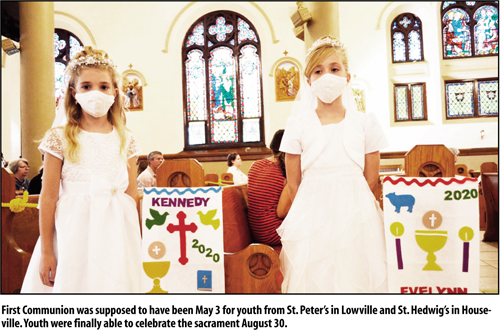December 23, 2020 Editor’s Note: This is the first article in a multi-article feature about catechesis during the pandemic. Articles highlighting models of catechesis are on the following pages. By Mary Beth Bracy OGDENSBURG – In August, the diocesan Faith Formation Office suggested that pastors and catechetical leaders “survey their catechists to ascertain if they were willing to do in-person instruction, and inquire from parents which approach they would prefer, e.g., in-person, virtual, or hybrid,” explained Sister Ellen Rose Coughlin, SSJ, director of Faith Formation. “Pastors needed to know whether they would have catechists who were available for our Faith Formation program for children and for young people.” Overcoming challenges “Their challenge was how they would deliver it,” she said. “To date, we have heard from nearly all the parishes. Depending on local circumstances, they are offering either in-person instruction, virtual instruction, home instruction or a hybrid model (virtual and in-person.) If they are offering in-person instruction they have completed a plan which fulfills the New York State Department of Health guidance and submitted an acknowledgment to our office attesting to the fulfillment of safety protocols.” Although COVID-19 has resulted in the interruption of daily life, Sister Ellen Rose said parishes were eager to continue educating others in the faith. “One of the things that we learned from pastors and catechetical leaders is that they did not want Faith Formation for children and young people to be put on pause,” she said. Anita Soltero, assistant director of Faith Formation for the Eastern Region of our diocese, expressed that, “the biggest challenge during the initial shutdown was how to continue to offer our Faith Formation programs.” “For the most part, that did not happen,” she said. “We had class on Sunday, and the following week, we were all in quarantine! No one anticipated it would last as long as it did, so we were not prepared to offer on-line learning opportunities at that time. Most students do not bring their books home every week, so we could not continue the lessons. Some parishes were able to do that and communicated via email, but they were the minority. The other challenge was completing the sacraments. Since the shut-down happened in March and continued through the end of the summer, confirmations scheduled for the spring had to be postponed as well as the reception of first Holy Communions which usually take place in May and June. Most of those students have now been able to complete those sacraments, but with social distancing and masks in place! It has been a slightly different experience, but again, through careful planning and with great resolve on behalf of our catechetical leaders, the parents, pastors and parish staff, we are caught up!” One positive aspect is that catechists are increasingly utilizing digital media. “The learning curve that took place over the past few months was tremendous,” Soltero said. “We’re all running Zoom meetings, and the idea of ‘virtual’ learning is no longer a foreign concept. The other important thing… is how we relied on the family to provide in-home catechesis during this time. Unfortunately, many of our parents are not comfortable with this. It has been a delicate balance trying to provide guidance for the parents, as well as our youth.” Reactions of parents and youth “Obviously, the preference for families is that they would like in-person classes,” she said. “In those places where that’s happening, it’s going along quite smoothly, and in places where it’s virtual – other than occasionally having difficulty with internet issues – that’s also going along quite well.” Soltero agreed. “Overall, the response has been better than anticipated,” she said. Most catechists “indicated that both parents and students were happy to return to in-person classes for religious education. There are some families that were not comfortable meeting in-person, which is understandable, but the majority did return. Our catechetical leaders and catechists have come up with very creative ways to provide online learning opportunities for families who choose to stay home. It’s been amazing to see how everyone has come together to make that happen.” Similarly, Catherine Russell, assistant director of Faith Formation for the Western Region of our diocese, noted “the response from our catechetical leaders has been enthusiastic and courageous in trying to understand and meet the needs of their families. Parents, we are told, have for the most part been enthusiastic to return to in-person classes. A virtual option for families who feel it is not safe is being provided in most parishes. Students we are told are very happy to come back!” Engaging families “Catechetical leaders have also recognized … that they are looking at this as an opportunity, because it’s an opportunity to engage families and parents,” she said. “They are using that opportunity, particularly for home instruction or for virtual instruction; it requires the presence and the active engagement of the parents.” Parishes, conveyed Sister Ellen Rose, “are trying to move ahead with their sacramental programs, whether it be for First Communion or reconciliation, and likewise confirmation, and they are determining the best way to do this. Some of the parishes have been really quite creative. One of the parishes has certain grades meeting only once a month, but they meet for an extended period of time. They divided the children and young people by grade and that’s working out very well. The parents are engaged and are part of the program.” Keeping catechesis available What is Faith Formation? Ready to help |
||||


